Israel-Hamas war protesters clash with officers at Emory in Atlanta
Published in News & Features
ATLANTA — Hundreds of people protesting the Israel-Hamas war and Atlanta’s planned public safety training center set up camp at Emory University’s quadrangle Thursday morning, prompting clashes with law enforcement and the arrests of several activists.
The encampment mirrors a growing number of college protests across the country. A smaller crowd also gathered at Kennesaw State University during the lunchtime hour.
Protesters at Emory were not only protesting the war but also the construction of the police training facility at the site of the old Atlanta Prison Farm in DeKalb County.
The Jewish community is planning counter-demonstrations at 7 p.m. at the quad and in Emory Village at Ali’s Cookies.
The morning gathering at Emory prompted the university to send an alert to students and faculty to remain inside and avoid the quad.
“Early this morning, several dozen protesters entered our Atlanta campus and set up an encampment on the Quad,” university President Gregory Fenves said in an email to the campus community. “These individuals are largely not affiliated with Emory and were disrupting the university as our students finish classes and prepare for finals. This is completely unacceptable. In response to this encampment, the Emory Police Department notified these individuals that they were trespassing. When they refused to leave, law enforcement cleared the Quad.”
Earlier this week, Gov. Brian Kemp said he wouldn’t tolerate demonstrations that shut down Atlanta traffic after pro-Palestinian protesters disrupted traffic and blocked bridges in several cities, including Chicago, Miami and San Francisco.
“I know I don’t need to make this call,” Kemp said, recounting a conversation with Col. Billy Hitchens, the commissioner of the Department of Public Safety.
“You know how I feel about people blocking bridges, airports and other things like we’re seeing around the country,” he added. “I said, ‘If they do that, lock their ass up.’”
While traffic was not disrupted during the demonstration at Emory, videos posted online late Thursday morning appeared to show police officers and state troopers clashing with protesters as some people were taken into custody. Atlanta police officers carrying rifles and zip ties could be seen walking through the makeshift encampment as some demonstrators were led away with their hands behind their backs. Activists and students said police used pepper spray.
An Atlanta police spokeswoman confirmed officers were sent to the campus at the university’s request but would not say how many arrests had been made, referring all questions to Emory officials.
Emory police Commander Thomas Mann told The Atlanta Journal-Constitution that people unaffiliated with the university had infiltrated the group.
“The ones that were arrested, there wasn’t anything peaceful about what was going on,” he said, adding that charges will include criminal trespass and assaulting police officers.
Lt. Gov. Burt Jones also weighed in, telling the AJC: “We will not allow pro-terrorist radicals and liberal anarchists to invade Georgia’s campuses. These criminals have only one goal: disruption. These heinous acts of antisemitism seen across the country cannot continue. In Georgia, they will be stopped, and these criminals will be punished.”
Tara Doyle, a lecturer at Emory’s Candler School of Theology, said the use of force was unnecessary.
“I am so disappointed in this university,” she said. “It was … heavy-handed, unnecessary violence against our students.”
Nearly 30 miles north, the scene was markedly different as about 150 pro-Palestinian demonstrators marched across Kennesaw State’s campus without a police officer in sight.
Carrying signs and waving flags, the students called for an end to Israel’s offensive in Gaza. Chants of “Free Palestine” and “End the Occupation” echoed across the campus as a small contingent of Pro-Israel counter-protesters stood nearby.
Among the counter-protesters was Dave Clark, a Jewish KSU student who is a member of the university’s Chabad and Hillel groups. Holding up one side of an Israeli flag, the sophomore history major said the pro-Palestinian demonstrators made him feel “unsafe” on campus.
Several of the pro-Palestinian students pushed back on that sentiment, saying they were there for a peaceful demonstration.
”I’ve only been here a few minutes and someone already called me a Jihadist,” said Ali Dabdoub, a Palestinian KSU student studying software engineering. He arrived late to the demonstration because he was taking an exam.
Carrying a Palestinian flag and wearing a black and white keffiyeh, Dabdoub said he was impressed by the turnout, not just on KSU’s campus but at colleges across the U.S.
“Falastin hurrah,” he said in Arabic, which translates to “free Palestine.”
“I believe the world is waking up. I know it’s going to happen. It’s just a matter of time.”
Several Georgia colleges and universities, including Emory, have held rallies and demonstrations since the war began Oct. 7 with Hamas’ attack on Israel that killed an estimated 1,200 Israelis and foreigners. More than 34,000 Palestinians have been killed during the conflict, according to Gaza’s Health Ministry, at least two-thirds of them women and children.
There are believed to be about 130 Israeli hostages still held in Gaza, of the roughly 240 initially taken by Hamas, according to CBS News.
Those protesting the war are demanding schools cut financial ties to Israel and divest from companies enabling its monthslong conflict. At the same time, some Jewish students say the protests have veered into antisemitism and made them afraid to set foot on campus as graduation nears, partly prompting a heavier hand from universities. Some institutions have called in police to break up demonstrations.
At New York University this week, police said 133 protesters were taken into custody, while more than 40 protesters were arrested Monday at an encampment at Yale University. Columbia University averted another confrontation between students and police earlier Wednesday. University President Minouche Shafik had set on Tuesday a midnight deadline to reach an agreement on clearing an encampment, but the school extended negotiations until early Friday.
At Emerson College in Boston, 108 people were arrested at an encampment overnight and four police officers suffered injuries that were not life-threatening, Boston police said.
Upon hearing of the clashes with police at Emory on Thursday, Georgia NAACP President Gerald Griggs said that they are requesting a meeting with Emory’s president. The organization wants a “detailed understanding of events” that took place, including the reasoning behind the way the university responded to protesters, Griggs said in a statement.
Additionally, the Georgia Chapter of the Council on American-Islamic Relations issued a statement condemning the “use of force and arrests against peaceful protesters” at the university.
”Emory University and APD fully bear responsibility for the violence we are seeing at the Emory campus right now. Students and protesters must be allowed their full constitutional rights,” the statement read.
While grappling with growing protests from coast to coast, schools have the added pressure of May commencement ceremonies.
At Morehouse College, there has been pushback to the announcement that President Joe Biden will speak at graduation May 19. Emory holds its graduation May 13, with Morehouse School of Medicine President and CEO Valerie Montgomery Rice scheduled to speak.
_____
(Staff writers Cassidy Alexander and Jozsef Papp contributed to this article. Material from the Associated Press was also used.)
_____
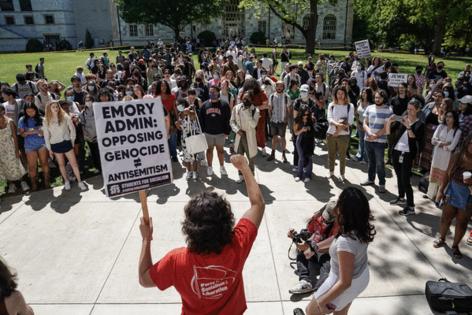
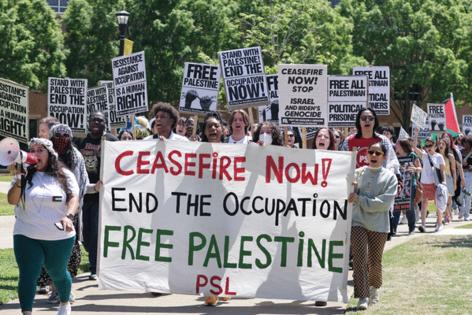
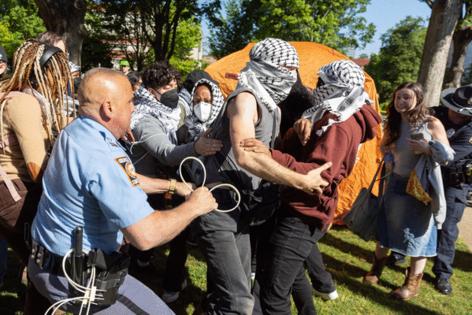
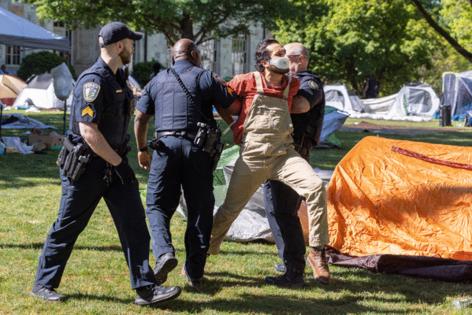
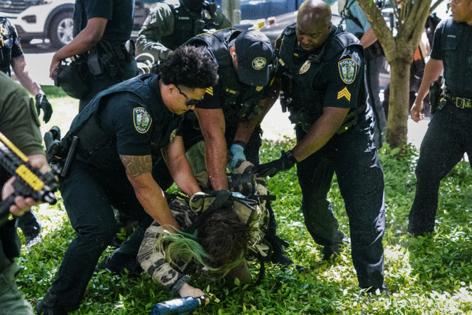











Comments